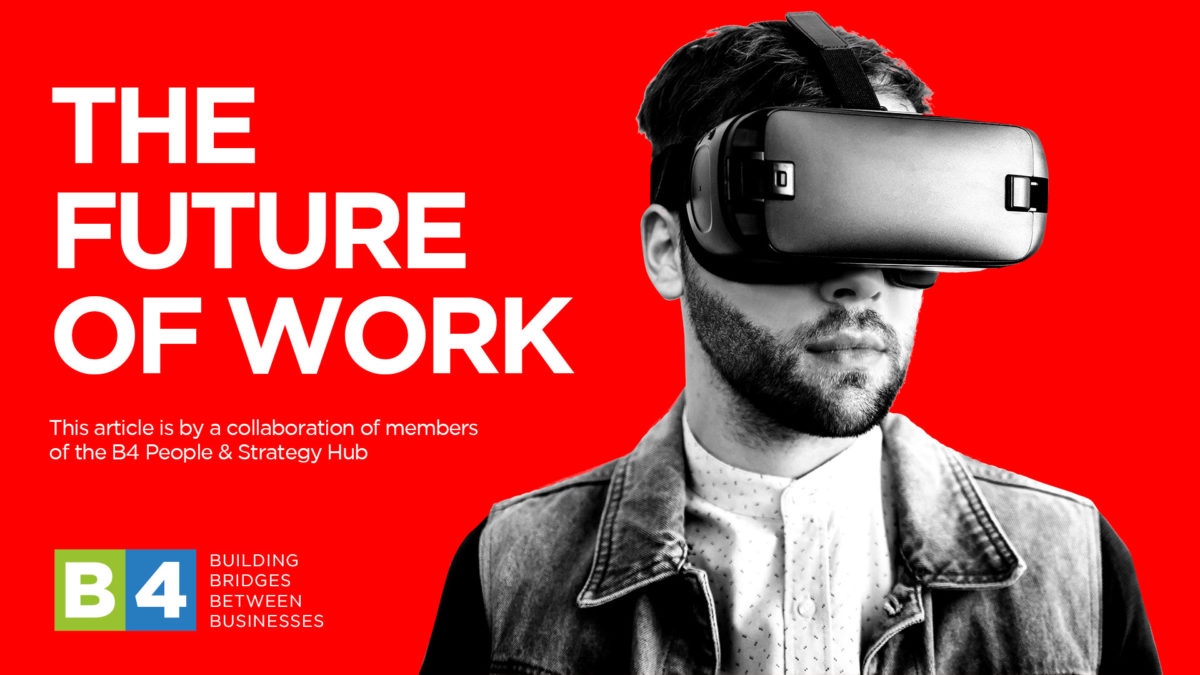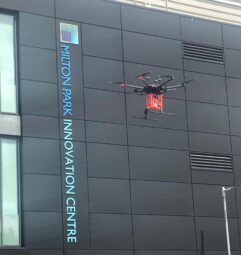
The Future Of Work
The world of work is changing. Artificial intelligence, automation, remote working, and robotics will make this shift as significant as the mechanisation in prior generations of agriculture and mass manufacturing. While some jobs will be lost, and many others created, almost all will change.
Not least has the impact of COVID-19 moved the opportunity to work remotely from an idea to reality in such a short period of time. With many organisations reporting that hybrid models of working for many employees is here to stay. The virus has broken through cultural and technological barriers that prevented remote work in the past, setting in motion a structural shift in where work takes place, at least for some people.
In a recent survey (finder.com) reported 26% of UK workers could work remotely three to five days a week as effectively as they could if working from an office. If remote working takes a hold at this level, it will have a profound impact on urban economies, transportation, and consumer spending, among other things. However, for a significant proportion of the workforce, there is little or no opportunity for remote working, and many of the low wage jobs are at most risk from automation and digitisation, therefore accentuating the risk of inequalities at a social level.
In this article, we share our thoughts on the rapidly changing factors affecting businesses and how leaders are facing up to these issues, as well as the backdrop of the pandemic creating an accelerated cultural shift in the way we approach these changes.



Grant Hayward, Collaborent
The world of work has changed significantly since I transitioned 12 years ago from my “former life” as a director and shareholder of a national commodity trading company, to this one running my own small company helping and inspiring other businesses. Back then, I felt I was a supportive and caring employer. But I have since had extensive engagement with charities and social enterprises providing support services and have learned so much as a B Leader, supporting and promoting the B Corp movement of Business as a Force for Good. This has expanded my understanding significantly of workplace culture and what a truly purposeful workplace is.
The reason for explaining this is that I have been on a journey. One that I believe all of us are on at various stages in our progression. The imperative is that we ensure the journey (and ultimately the destination) enhances our organisations, people, local communities, the environment, our local economy and us as individuals. If we strive for our businesses to be a Force for Good as well as the profit we make, these workplaces of the future will be ones that the best people will want to work in, buy from, invest in, and supply to.
Cath Convery, Explosive Learning Solutions
I type this as I wait to start a teams meeting that will last the majority of the day. Teams, and my clients firewall, has been updated overnight and those in the meeting can’t access all of the functionality – frustrating for everyone – I can feel the headache coming on and this is more than simply staring at a screen all day! COVID has brought rapid innovation and businesses have had to pivot to survive and in some cases thrive. In March we were all jumping onto virtual meetings and using this technology in the evening to catch up with family and friends. Some 9 months later there are fewer people engaging in the use of tech in the evening. COVID has given us a glimpse of a future but surely not one where we stop human interaction – isn’t that what makes us human?



Nicola Wallbank, Julian Taylor Solicitors
In the employment relationship, the traditional focus has been on controlling how employees work. With a surge in home working, and the inability to control how things are done to the same extent, we have seen a significant shift towards delivery and outcomes. This has huge positives, including a move away from presenteeism and improved recognition that employees who can’t work in traditional ways, perhaps due to disabilities or care commitments, can make a hugely valuable contribution. I am positive that lockdown will have challenged many unhelpful views on flexible working, and for that I am delighted. It is however important for employers to remember that whilst they relax their grip on control, their legal obligations to staff have not lessened. Employers must adapt their approach to deal with the challenges that a remote workforce brings. Particular attention should be paid to health, safety and wellbeing, and ensuring homeworkers are taking adequate breaks. Homeworkers can feel isolated, and bullying can still take place in a remote environment, so support needs to be available. It will also be vital for employers to adopt and communicate rules for caring for company property, maintaining confidentiality, data protection and requirements to attend the office or meetings when needed. While homeworking presents lots of positives, employers should consider its broad consequences and adopt sensible homeworker policies.
Steve Cook, V. Purposeful Strategy
Clearly the workplace is changing rapidly. Most workplaces are making changes to meet the needs of their current workers and business practices, primarily as a result of COVID and legislation, but based on largely historic frameworks, hierarchies, systems and mindsets. In turn, change decisions are often designed to meet the needs of a workforce that grew up and entered the workplace in a very much pre-COVID era, based on traditional understandings of what work and business meant. Until recently, each generation of worker was educated slightly differently about work but had broadly the same understanding of, and attitude to, work.
The next generation (The ESG Generation perhaps!) of workers, though, are likely to have radically different perspectives – and this could have a profound effect on their attitude to the cultural, physical, technological and purposeful work environment that they will engage with or that will engage with them. Importantly, their value sets are very different and this will create a generation of workers who will look at employment and the organisations they wish to invest their time with very differently. They have the mindset and means to look very carefully and critically indeed.
Whilst some businesses are already fully addressing the needs of their future talent and re-defining themselves accordingly, many are not. The future of work is going to be very different and those that respond to this as a strategic development will be better fit for future purpose and future talent than those that don’t.
Jarl Severn – CEO Owen Mumford
Of course we have seen unprecedented change in the workplace this year, driven by global circumstances which has impacted not just the way we work, using new tools and methods of communicating, but how we manage behaviours too. It has introduced an unusual dynamic that puts pressure on managers to define expectations, and on employees to make sure that they are seen to be performing. It can be difficult to keep people motivated with the absence of the physical interface from a face-to-face meeting. Nothing can really replace the observation and interpretation of reactions and gestures experienced in person, and often challenges or misunderstandings can be quickly solved or clarified with a 2-minute direct exchange.
Although there’s no doubt that the future of the workplace will embrace what was accomplished this year in terms of a far larger contingent of office workers operating from home, we need to be mindful of other factors that will influence how we work in the years to come. The relentless pace of technology evolution continues and will still represent the greatest adjustment to change. From our perspective, we see everyday that machine learning is transforming the healthcare space and AI is having a major impact on medicine, with significantly more accurate diagnosis and the prevention and treatment of diseases. Digital transformation in the workplace is happening in parallel and as manufacturers, we will likely experience to a greater extent the impact of this change, as we move towards industry 4.0 solutions that implement better control and an increase in supply chain transparency. A McKinsey survey earlier this year showed that 90% of manufacturing and supply chain professionals plan to invest in talent for digitisation, that’s definitely something to think about. Ideally, the balance will come from systems that allow manual workers and machines to function together collaboratively, complementing each other’s strengths and compensating for each other’s limitations.
Final Thoughts
As everyone has mentioned COVID-19 has forever changed how we work, where we work and the relationship between employers and employees. Many organisations are acting quickly, thinking beyond re-entry to reimagine the future work and the digital, physical and emotional dimension of their organisations. The next normal is here. Is your business resilient and responsible to thrive in a post-pandemic world?
More in Business Strategy

What prospects are thinking but often fail to ask
I was at a B4 Ecosystem Event recently run by Caroline O’Connor of Fourth Born and she posed a brilliant question to the room. Article by David Finch of Purple Frog

‘Meanwhile in Oxfordshire..’ Case Study: Ducky Zebra, the sustainable kidswear brand...
‘Often girls’ clothes are pink, cute and impractical. They promote kindness, but not always confidence. And boys’ clothes are often blue, aggressive and adventure seeking. They promote confidence, but not always kindness. I wanted to bring these two characteristics together and allow all children, no matter what their gender, to celebrate both kindness and confidence.’ – Sally Dear, Founder of Ducky Zebra

Innovative drone delivery trials take place at Milton Park
A pilot demonstration for a set of innovative drone and electric van freight trials was successfully completed at Milton Park.
From this author

LGBT History Month
February is LGBT History Month, a great time for businesses to think about how inclusive they really are for LGBT employees and what they can do to become more so.

LGBT History Month
February is LGBT History Month, a great time for businesses to think about how inclusive they really are for LGBT employees and what they can do to become more so.

LGBT History Month
February is LGBT History Month, a great time for businesses to think about how inclusive they really are for LGBT employees and what they can do to become more so.


